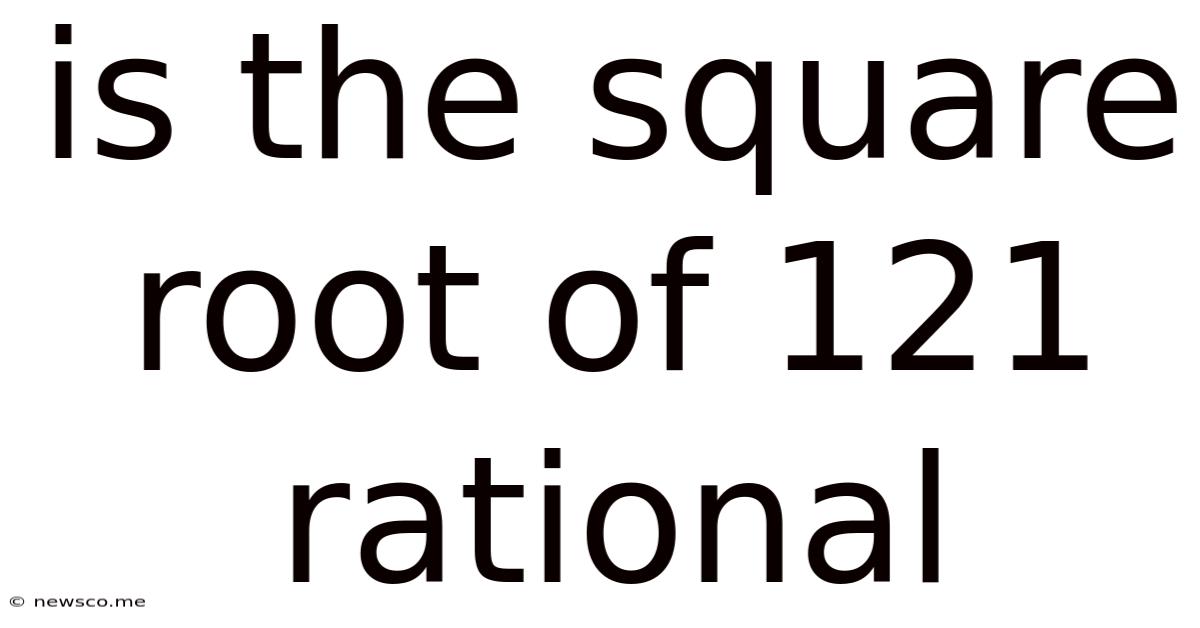Is The Square Root Of 121 Rational
News Co
Mar 26, 2025 · 5 min read

Table of Contents
Is the Square Root of 121 Rational? A Deep Dive into Number Theory
The question, "Is the square root of 121 rational?" might seem deceptively simple at first glance. However, exploring this question provides a fantastic opportunity to delve into fundamental concepts within number theory, particularly the distinctions between rational and irrational numbers. This article will not only answer the question definitively but also unpack the underlying mathematical principles, exploring related concepts and providing a comprehensive understanding of rational and irrational numbers.
Understanding Rational Numbers
Before we tackle the square root of 121, let's establish a firm grasp on what constitutes a rational number. A rational number is any number that can be expressed as a fraction p/q, where both p and q are integers, and q is not equal to zero. This seemingly simple definition has profound implications. Examples of rational numbers abound:
- 1/2: A classic example, easily recognizable as a fraction.
- 3: Can be expressed as 3/1, fitting the definition perfectly.
- -4/5: Negative fractions are also rational.
- 0.75: This decimal can be written as 3/4, fulfilling the criteria.
- 0.333... (repeating decimal): Although it appears as a non-terminating decimal, it can be expressed as the fraction 1/3.
The key takeaway is that any number that can be represented as a ratio of two integers is rational. This includes terminating decimals and repeating decimals. Non-terminating, non-repeating decimals, on the other hand, belong to a different category – the irrational numbers.
Delving into Irrational Numbers
Irrational numbers are numbers that cannot be expressed as a fraction p/q, where p and q are integers and q ≠ 0. These numbers, when expressed as decimals, are non-terminating and non-repeating. This means their decimal representation goes on forever without any discernible pattern. Famous examples include:
- π (pi): The ratio of a circle's circumference to its diameter, approximately 3.14159...
- e (Euler's number): The base of the natural logarithm, approximately 2.71828...
- √2 (the square root of 2): This number cannot be expressed as a simple fraction.
The existence of irrational numbers significantly expands the realm of numbers beyond the seemingly straightforward world of rational numbers. Their non-repeating, non-terminating nature makes them fascinating objects of study in mathematics.
Calculating the Square Root of 121
Now, let's return to our original question: Is the square root of 121 rational? To answer this, we need to find the value of √121. The square root of a number is a value that, when multiplied by itself, gives the original number. In this case:
11 * 11 = 121
Therefore, the square root of 121 is 11.
Is 11 Rational? The Verdict
Since 11 can be expressed as the fraction 11/1 (where both 11 and 1 are integers, and the denominator is not zero), it perfectly satisfies the definition of a rational number. Therefore, the answer to our initial question is a resounding yes. The square root of 121 is rational.
Extending the Understanding: Perfect Squares and Rationality
The square root of 121 is a special case because 121 is a perfect square. A perfect square is a number that can be obtained by squaring an integer. Other examples include 4 (2²), 9 (3²), 16 (4²), and so on. The square roots of all perfect squares are always rational numbers because they can always be expressed as an integer, and every integer is a rational number (as it can be written as itself divided by 1).
Exploring Further: Square Roots and Rationality Beyond Perfect Squares
However, it's crucial to understand that not all square roots are rational. For example, the square root of 2 (√2) is irrational. It's a non-terminating, non-repeating decimal. This highlights the importance of considering whether the number under the square root is a perfect square. Only the square roots of perfect squares are guaranteed to be rational.
Perfect Cubes and Higher Powers
The concept extends beyond perfect squares. We can also consider perfect cubes (numbers that result from cubing an integer, like 8 = 2³), perfect fourth powers, and so on. The cube root of a perfect cube, for example, will always be a rational number.
Practical Applications and Real-World Significance
While the concept of rational and irrational numbers might seem abstract, they have significant practical applications in various fields:
- Engineering and Physics: Precise calculations involving lengths, areas, and volumes often require understanding rational and irrational numbers.
- Computer Science: Representing numbers in computer systems involves considerations of rational and irrational numbers, particularly in handling floating-point arithmetic.
- Finance: Calculations involving interest rates, compound growth, and financial modeling rely on precise numerical representations.
Conclusion: A Foundation in Number Theory
Understanding the distinction between rational and irrational numbers is fundamental to a deeper appreciation of mathematics. The seemingly straightforward question regarding the rationality of √121 has served as a springboard to explore core concepts within number theory. By examining the definitions of rational and irrational numbers, investigating perfect squares, and exploring real-world applications, we've gained a comprehensive understanding of this essential topic. The fact that √121 is rational is a specific instance highlighting a broader principle within the fascinating world of numbers. This exploration serves as a solid foundation for further exploration into more advanced mathematical concepts. Further investigation could delve into continued fractions, the properties of irrational numbers like π and e, and the proofs related to the irrationality of certain numbers. This fundamental understanding of rational and irrational numbers provides a crucial building block for more advanced mathematical studies.
Latest Posts
Related Post
Thank you for visiting our website which covers about Is The Square Root Of 121 Rational . We hope the information provided has been useful to you. Feel free to contact us if you have any questions or need further assistance. See you next time and don't miss to bookmark.